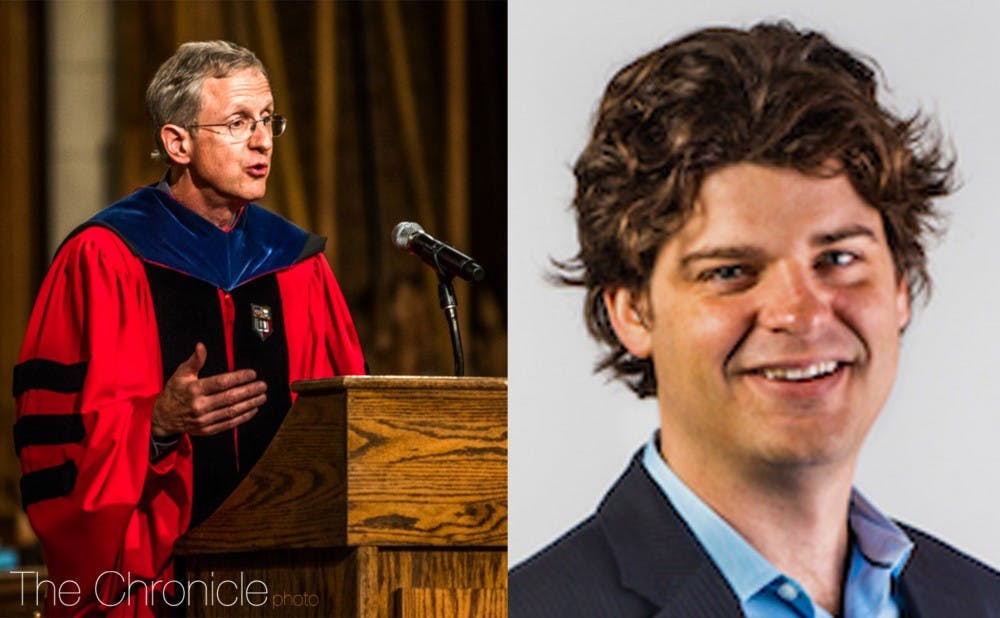Interested in playing with puppies to learn about cognitive neuroscience? Building a bike from scratch? Talking about sex with a top Duke administrator? Spring Breakthrough might be the program for you.
The program, now in its second year, offers an alternative option to partying over Spring Break and encourages students to explore their intellectual interests by offering short, seminar-style courses in a risk-free setting. Classes are offered for no credit, no grade and no cost, although they will appear on students’ transcripts. The program will run for five days during Spring Break in 2018 from March 11 to March 15.
“The appeal is just to genuinely get a greater understanding in a subject matter with no risk whatsoever,” said Carolyn Mackman, special projects manager in the Office of the Provost, who is helping organize the program. “There’s absolutely no consequences other than learning.”
The idea for the program came from Provost Sally Kornbluth, who took a three-week, ungraded class outside of her major while attending Williams College that she said changed the course of her career. The program will be funded through the Office of the Provost.
Spring Breakthrough is available for first-years and sophomores, and the courses generally run from the morning through the early evening, with possible field trips. Students stay in their residence halls, with all meals and materials provided. Registration will open Nov. 16.
Courses offered this year include “Chopped! The Historical Edition,” which will use the Rubenstein Rare Book and Manuscript Library’s collection of cookbooks to explore the culture and politics of food, and “Presidential March Madness,” which will evaluate the successes and failures of each presidency using NCAA brackets. In “Build a Bike,” students will work with the owner of Durham Cycles to construct bike in time to be ridden during the Spring Breakthrough closing ceremony.
“Faculty members have a passion for teaching their course,” Mackman said. “They’re as excited to try something new and make a breakthrough as the students attending their courses.”
There are currently 12 classes offered—an increase from the seven last year—that will have between eight and 15 students each.
Steve Nowicki, dean and vice provost for undergraduate education, is teaching a course called “The Birds and the Bees” that aims to examine sex from the perspective of the natural sciences.
He noted that most people think only about the ways mammals have sex but that there are many variations among different organisms.
“There is a trigger warning in my course description,” Nowicki said. “If people are a little squeamish, they should know we will be talking about sex.”
Although he hasn’t fully developed the curriculum yet, he said that a field trip to Raleigh’s natural history museum is likely and that they may venture into nature depending on the weather.
One of the most popular courses will surely be “Puppies!” taught by Brian Hare, associate professor in evolutionary anthropology and founder of the Duke Canine Cognition Center. Students will visit puppies in shelters and other baby animals in zoos to explore concepts in cognitive neuroscience, evolution and behavioral economics.
Hare explained that how we think about puppies has an impact on how we think about ourselves. This can help answer questions about why certain people have certain talents and why we find some things more attractive than others.
“How should we rear a puppy or child to maximize their potential in their lives?” he said. “What kind of experiences can I give this puppy to be the best it can be?”
He noted that students will also explore why we love puppies so much, which is relevant to thinking about how humans interact with each other.
This is Hare’s second year teaching the course, and he said he enjoys meeting new students and tackling fun topics with them—without the added work of grading assignments.
“If you enjoy learning and thinking about difficult problems but in a fun, open environment, it’s basically like going to camp, it’s super fun,” he said.
Deb Johnson, assistant vice provost of undergraduate education, who is also coordinating the program, explained that Spring Breakthrough gives students a stress-free way to explore a discipline they may not have previously considered.
It also serves to connect students and faculty, providing instructors with the chance to get to know undergraduates in different fields.
“All of these classes have wonderful amazing faculty that want to hang out with students,” Johnson said. “They said the students [last year] were just so engaged, so energetic, so open minded.”
The program is particularly appealing to first-years and sophomores because they haven’t yet chosen a major and are still exploring ideas, she noted.
Johnson explained that some challenges of Spring Breakthrough include making sure enough faculty are interested in creating courses for the program. In addition, holding it during Spring Break means that some students with previously planned trips cannot attend.
Despite these issues, the coordinators are optimistic that the program will expand in the coming years and include more faculty members.
“Here at Duke, we are extremely interested in connecting students and faculty because that makes the overall experience better for students,” Johnson said.
Get The Chronicle straight to your inbox
Signup for our weekly newsletter. Cancel at any time.

